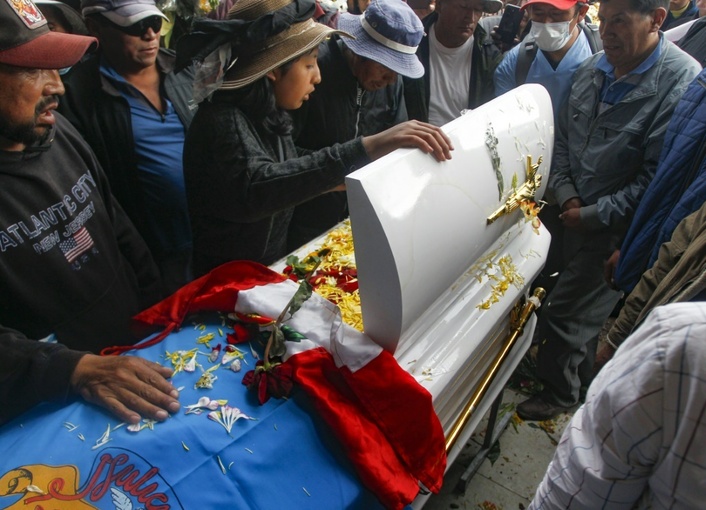Weeks-long protests that have left dozens dead across Peru continued on Thursday, with escalating tensions in Andean city Cusco prompting the government to preemptively close the tourist hub's airport.
Supporters of ousted president Pedro Castillo have marched and barricaded streets around the South American country demanding new elections and the removal of current leader Dina Boluarte.
The demonstrations have at times turned violent, and clashes with security forces have left 42 people dead, including a police officer who was burned alive in a vehicle, while hundreds more have been injured.
Almost half of the victims died in clashes Monday night in the southern Puno region, where 17 people were due to be buried on Thursday.
Major flash points have occurred near the country's airports, guarded by security forces after protesters stormed runways during an initial wave of uprisings in early December.
In Cusco, the gateway city to Peru's tourism crown jewel Machu Picchu, the main airport was suddenly closed Thursday "as a preventative measure," the country's transportation ministry announced on Twitter.

Peru's rights ombudsman said one person died and more than 50 people, including 19 police officers, were injured in the turmoil, while police said they had arrested 11 people.
In Juliaca, a city in the southern Puno region close to the Bolivian border, the 17 deceased protesters were laid to rest Thursday.
Gathered in a circle around a red coffin, relatives of one of the victims held posters reading: "Dina corrupt murderer" and "we are not terrorists but citizens who demand justice."
- March against 'dictatorship' -
"It is painful to lose a member of your family for fighting for your rights," 48-year-old Fidel Huancollo, whose cousin had died, told AFP.

Also on Thursday, trade unions, left-wing parties and social collectives marched through Lima, the capital which has largely been spared of violence thus far, to denounce a "racist and classist... dictatorship."
In addition to demanding Boluarte's resignation, protesters want Congress to be dissolved and a new body set up to rewrite the constitution -- which was adopted in 1993 under the mandate of Alberto Fujimori.
The former president is currently serving a 25-year prison sentence for crimes against humanity committed during his time in power.
The mass demonstrations first broke out in early December, after Castillo was ousted from office for attempting to dissolve Congress and rule by decree, seeking to prevent an impeachment vote against him.

Boluarte, 60, was Castillo's vice president but took over once he was ousted on December 7.
Castillo, who was being investigated in several fraud cases during his tenure, has been remanded in custody for 18 months, charged with rebellion.
cm/ljc/ll/bc/des/mlm
© Agence France-Presse
Your content is great. However, if any of the content contained herein violates any rights of yours, including those of copyright, please contact us immediately by e-mail at media[@]kissrpr.com.
Source: Story.KISSPR.com

